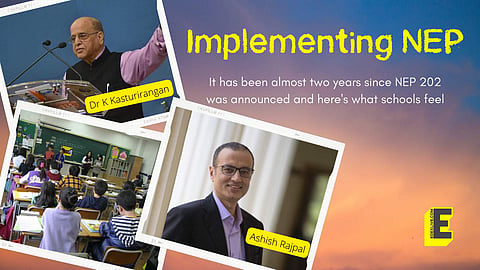

July 29, 2020 was the day when the National Education Policy (NEP) 2022 was announced. Now, July 29, 2022, is around the corner and it has been two years since the announcement of NEP. Yet, 70 per cent of the schools feel that they are not fully ready to implement it. They think that a lot of work is yet to be done.
This is one of the major findings that emerged from the survey conducted by Singapore-based XSEED Education, an academic programme for schools which helps build thinking and problem-solving skills in students.
To understand the attitudes of school leaders towards NEP 2020 and their challenges better, XSEED Education initiated this survey last month and received responses from 191 schools located in geographically diverse locations. "This has helped us understand the needs of schools better and hence, help them with implementation where we can," says Ashish Rajpal, Founder, XSEED Education.
So, what else did the survey reveal? We find out in a detailed conversation with the Founder. Excerpts from our conversation:
Since most educationists think they have work to do and are not fully prepared to implement NEP, what work are they referring to?
They were asked to self-rate on overall preparedness on a scale of 1-10, to which only 12 per cent of respondents indicated a 9 or 10 level of readiness. Pedagogy or methodology and teacher skills were the most cited as the area in which they feel the most work needs to be done.
Since pedagogy is the top concern, could you be more specific about what they highlighted?
When asked to choose among aspects of the NEP which they were most interested in, they specifically chose "Making experiential learning happen across subjects" (48 per cent) and "Strengthening students' core concepts in the academic subjects" (37 per cent) as their top two. These are both goals that involve a fundamental shift in the teaching/learning process (that is, pedagogy) to a way in which students are doing more hands-on learning and problem-solving in the class.
Though the pedagogy-related points above were cited as the top implication of the NEP, teacher professional development was also chosen by significant numbers (around 27%) of respondents — which aligns with what we've learned from our interactions and experience as well.
What is it about the NEP that they find most beneficial for students? And what do they need more time to understand?
Based on our interactions with school leaders at the XSEED Conference and otherwise, the focus on empowering teachers and improving them as professionals is a key area that many agree will yield results for students. Competency-based assessment, specifically what it looks like in practice and how to implement it regularly, is one aspect of the NEP we have heard many school leaders ask about and want to understand better.
Can you tell us a few highlights of the survey?
After admissions and enrollments, teacher quality is the top challenge faced by schools in India
Of schools surveyed, 70 per cent say they are not fully ready for NEP and have work to do
Making the classroom experiential was the top NEP implication for school leaders
As per your interactions and experience, how long before the NEP is implemented? What are a few major concerns?
The NEP is in the process of being implemented, but this is not happening consistently across schools. Many of XSEED's partner schools are already implementing many aspects well — particularly those aspects that are well-aligned with the XSEED programme, like thematic and developmental early childhood education, foundational literacy and numeracy, experiential learning, continuous teacher professional development, and competency-based assessment.
The major need expressed by many is about the "how" of achieving the policy goals. Without a clear set of tools aligned with these goals — for example, experiential lesson plans, skill-based test questions, or hands-on professional development modules — many schools will struggle to ever implement the NEP.
